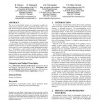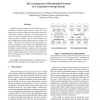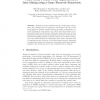726 search results - page 3 / 146 » Securing XML data in third-party distribution systems |
SAC
2006
ACM
13 years 5 months ago
2006
ACM
The use of recommender systems in e-commerce to guide customer choices presents a privacy protection problem that is twofold. We seek to protect the privacy interests of customers...
SISW
2005
IEEE
13 years 11 months ago
2005
IEEE
Traditional storage systems have considered security as a problem to be solved at the perimeter: once a user is authenticated, each device internal to the system trusts the decisi...
WPES
2003
ACM
13 years 10 months ago
2003
ACM
Secure Multi-Party Computation enables parties with private data to collaboratively compute a global function of their private data, without revealing that data. The increase in s...
ACMICEC
2003
ACM
13 years 10 months ago
2003
ACM
A multi-agent marketplace, MAGNET (Multi AGent Negotiation Testbed), is a promising solution to conduct online combinatorial auctions. The trust model of MAGNET is somewhat diffe...
PKDD
2007
Springer
13 years 11 months ago
2007
Springer
Abstract. Analysis of privacy-sensitive data in a multi-party environment often assumes that the parties are well-behaved and they abide by the protocols. Parties compute whatever ...



